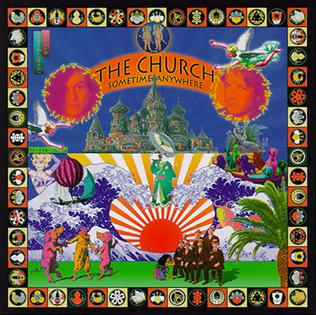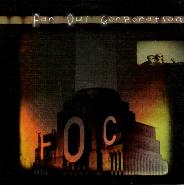Related Research Articles
The Crystal Set were an Australian indie rock group formed in March 1983. By 1987 the line-up was Russell Kilbey, Phillip Maher, Davey Ray Moor and Tim Seckhold (drums). In April 1988 Moor was replaced by Craig Hooper, who was replaced in turn by Luke Blackburn, in May 1989. The group issued two studio albums, From Now On and Almost Pure, before disbanding later that year. Russell Kilbey is the younger brother of the Church's mainstay, Steve Kilbey.

Steven John Kilbey is an English born Australian singer-songwriter best known as the lead singer and bass guitarist for the rock band The Church. He is also a music producer, poet, and painter. As of 2020, Kilbey has released 14 solo albums and has collaborated on recordings with musical artists such as Martin Kennedy, Stephen Cummings and Ricky Maymi as a vocalist, musician, writer and/or producer. Ian McFarlane writes that "Kilbey's solo recordings [are] challenging and evocative. They ran the gamut of sounds and emotions from electronic and avant-garde to acoustic and symphonic, joyous and dreamy to saturnine and sardonic".

The Screaming Tribesmen were an Australian rock band formed in Brisbane, Queensland in 1981 by mainstay Mick Medew on lead vocals and lead guitar. With various line-ups they released three studio albums, Bones and Flowers, Blood Lust (1990) and Formaldehyde (1993), before disbanding in 1998. They reformed in 2011 for performances until June 2012. Australian musicologist, Ian McFarlane, described how they, "fashioned a memorable brand of 1960s-inspired pop rock that combined equal parts existential lyric angst, melodic inventiveness and strident guitar riffs."
The Sports were an Australian rock group which performed and recorded between 1976 and 1981. Mainstay members were Stephen Cummings on lead vocals and Robert Glover on bass guitar, with long-term members such as Paul Hitchins on drums, Andrew Pendlebury on lead guitar and vocals, and Martin Armiger on guitar. Their style was similar to both 1970s British pub rock bands and British new wave. The Sports' top forty singles are "Who Listens to the Radio", "Don't Throw Stones", "Strangers on a Train" and "How Come". Their top 20 releases on the Australian Kent Music Report Albums Chart are Don't Throw Stones, Suddenly and Sondra.
Smudge are an Australian rock and indie pop trio formed in 1991 by Paul Duncan on bass guitar, Alison Galloway on drums and Tom Morgan on guitar and vocals. Morgan is known outside Australia as a song writing collaborator of Evan Dando and his band, the Lemonheads. In 1994 Duncan was replaced on bass guitar by Adam Yee and in 1997 Pete Kelly joined on guitar. Smudge signed with Half a Cow to issue four studio albums, Manilow (1994), Hot Smoke and Sassafras (1994), You Me Carpark. .. Now (1996) and Real McCoy Wrong Sinatra (1998), before going into hiatus from late 1999. Since 2002, Smudge play a few times a year. There has been no new music since 1998.

The Go-Betweens were an Australian indie rock band formed in Brisbane, Queensland, in 1977. The band was co-founded and led by singer-songwriters and guitarists Robert Forster and Grant McLennan, who were its only constant members throughout its existence. Drummer Lindy Morrison joined the band in 1980, and its lineup would later expand to include bass guitarist Robert Vickers and multi-instrumentalist Amanda Brown. Vickers was replaced by John Willsteed in 1987, and the quintet lineup remained in place until the band split two years later. Forster and McLennan reformed the band in 2000 with a new lineup that did not include any previous personnel aside from them. McLennan died on 6 May 2006 of a heart attack and the Go-Betweens disbanded again. In 2010, a toll bridge in their native Brisbane was renamed the Go Between Bridge after them.
The Bhagavad Guitars were an indie-rock band which formed in 1985 as Inner Circle in Canberra by Jeremy Butterworth on guitar and vocals, Kynan Hughes on bass guitar and Matt Kerr on drums and John Kilbey on guitar and vocals. Hughes was replaced successively by Adrian Workman and then by Tony Locke. They recorded three 12 inch extended plays for Red Eye before recording a studio album, Introversion, in 1991 which was shelved due to record company disputes until July 1996. Meanwhile, they issued their first album, Hypnotised, in May 1992 via Karmic Hit/Shock, and disbanded in 1998. The group reformed in 2008 to record a new album, Unfamiliar Places, released in May 2011.

The Blurred Crusade is the second album by the Australian alternative rock band the Church, released in March 1982 by EMI Parlophone. Moving away from the new wave leanings of their debut, it was stylistically more complex and "a smoother, fuller release". "With its mystical lyrics the second album ... brought the group's own style more into focus". The album peaked at No. 10 on the Australian Kent Music Report Albums Chart and "Almost With You" reached No. 21 on the related Singles Chart.

Grant William McLennan was an Australian alternative rock singer-songwriter-guitarist. He co-founded the Go-Betweens with Robert Forster in Brisbane in 1977 and issued four solo albums: Watershed (1991), Fireboy (1992), Horsebreaker Star (1994) and In Your Bright Ray (1997). He collaborated with other artists on side projects. In May 2001, the Australasian Performing Right Association called his "Cattle and Cane" (1983) one of its top 30 Australian songs of all time.

Amanda Gabrielle Brown is an Australian composer, multi-instrumentalist, singer and songwriter. She was the violinist of Australian indie rock band The Go-Betweens (1986–1989): recorded on their studio albums, Tallulah (1987) and 16 Lovers Lane (1988). Brown has also worked as a session musician and, since 2000, as a screen music composer. She won the AACTA Award for Best Original Music Score in 2020 for Babyteeth (2019) and also Best Original Music Score in a Documentary for Brazen Hussies (2020). At the APRA-AGSC Screen Music Awards of 2009 she won Best Music for a Documentary for Sidney Nolan: Mask and Memory (2008) and Best Music for a Television Series or Serial for The Secrets She Keeps at the 2020 ceremony.

Sometime Anywhere is the ninth album by the Australian alternative rock band the Church, released in May 1994.
Machinations are an Australian synthpop band which formed in 1980. They reached the top 20 on the Kent Music Report albums chart with Big Music in 1985. Their top 30 hits on the related singles chart are "Pressure Sway", "No Say in It", "My Heart's On Fire" and "Do to You". By 1989 the group had disbanded. They briefly reunited in 1997 and then reformed in 2012.
The Other Side is the second studio album by the Australian pop rock band 1927, which was released in July 1990. It peaked at number three on the ARIA Albums chart and reached No. 50 on its Australian Year End Albums Chart for 1990.

FOC or Far Out Corporation is the only studio album released by Australian collaborative rock group, Far Out Corporation, in October 1998. Its title is an initialism of the group's name. It is the sole album from the group, which was produced by Tim Whitten and the FOC at Airlock Studios, East Brisbane, via Polydor Records.
Richard John Ploog is an Australian drummer, songwriter, producer and singer who was a member of rock band The Church between 1981 and 1990. Ploog also drummed for Beasts of Bourbon in 1983, Damien Lovelock in 1988 and with fellow The Church member Peter Koppes in 1991 for an album and tour. He is the father of Irie Ploog, Ruben Ploog, Ollie Ploog, Alice Ploog and Gene Ploog

David Alexander John Steel is an Australian singer-songwriter, guitarist and producer. He is a former member of folk rock group, Weddings Parties Anything (1985–88) and pop band, The Whipper Snappers (1990–91). Steel has released eleven solo studio albums, including one as leader of Dave Steel and the Roadside Prophets and two albums with folk singer, Tiffany Eckhardt. He has been nominated for three ARIA Music Awards.

"Cattle and Cane" is a song by the Australian alternative rock band The Go-Betweens, released as the first single from their second album Before Hollywood. It was released as a single in the United Kingdom by Rough Trade Records in February 1983 and reached No. 4 on the UK Independent Chart. The single and album were both released in Australia on Stunn, a small label allied with EMI. The Stunn pressings were of poor quality and their distribution limited.
Curious (Yellow) was a pop, alternative rock band formed in 1987 by Swedish-born Karin Jansson, a singer-songwriter and guitarist, formerly of feminist punk band Pink Champagne. Curious (Yellow) had releases on Red Eye Records – an EP, I Am Curious and an album Charms and Blues. Both were produced by Steve Kilbey of The Church, who was Jansson's domestic partner. The band's name and that of their first release are references to the 1967 Swedish cult film I Am Curious (Yellow).
The Plunderers were an Australian band which formed in May 1984 in Canberra. The group's founding mainstays were Nic Dalton on bass guitar and vocals and Stevie Plunder on guitar and vocals. The group issued three mini-albums, Trust Us, Sarah's not Falling in Love, and Home Movie (1992); a live album, 13.7.91 Live! Live! Live! (1991); and three albums, No Era Is Safe (1986), Half A Cow (1986), and Banana Smoothie Honey (1992). Australian musicologist, Ian McFarlane, described their sound as "a punky brand of power pop that mixed frantic guitar riffs, sharp harmonies and diamond-hard pop melodies" before starting to "explore a more tripped-out kind of psychedelic revivalism". In 1989 Dalton and Plunder and their drummer, Geoff Milne, formed a side project, Hippy Dribble, playing their more psychedelic songs. In December 1990 the trio also formed Captain Denim to play "more laid-back songs mostly ... influenced by the likes of Buffalo Springfield, Country & Western and folk rock". Both these groups issued material including a split album, Silver Apples/Fade in 1994. In 1992, Dalton joined US band The Lemonheads and former Plunderers' keyboard player Andy Lewis and Plunder formed The Whitlams with Tim Freedman. Plunder died on 25 January 1996, at the age of 32 years and Lewis died on 12 February 2000, at the age of 33 years.

Goodbye Tiger is the fourth studio album by Australian rock music singer-songwriter, Richard Clapton. It was released in October 1977 via Infinity Records/Festival Records and was produced by Richard Batchens. It peaked at No. 11 on the Kent Music Report Albums Chart.
References
- 1 2 3 Waller, Lisa (29 November 1990). "Music: Cooking up Some Fun". The Canberra Times . Vol. 65, no. 20, 320. p. 26. Retrieved 2 September 2019– via National Library of Australia.
- 1 2 3 4 5 6 7 8 9 McFarlane, Ian (1999). "Encyclopedia entry for 'Jack Frost'". Encyclopedia of Australian Rock and Pop . St Leonards, NSW: Allen & Unwin. ISBN 1-86508-072-1. Archived from the original on 7 August 2004.
- 1 2 3 4 5 6 Holmgren, Magnus; Warnqvist, Stefan. "Jack Frost". hem2.passagen.se. Australian Rock Database (Magnus Holmgren). Archived from the original on 14 May 2011. Retrieved 2 September 2019.
- ↑ Nichols, David (2011). The Go-Betweens. Verse Chorus Press. p. 180. ISBN 9781891241901.
- ↑ Scott Howlett (5 December 1990). "Which one's Jack?". On The Street.
- ↑ Romney, Jonathan (5 March 1991). "Jack Frost review". Q Magazine. 55: 74.
- ↑ "Good Times. Two Distinctive Styles of Seasoned Writers". The Canberra Times. Vol. 65, no. 20, 347. 27 December 1990. p. 37. Retrieved 2 September 2019– via National Library of Australia.
- ↑ Jack Frost (1996), Snow Job, Karmic Hit Records [England]: Licensed to Beggars Banquet Records , retrieved 2 September 2019
- 1 2 Dicks, Brett Leigh (8 May 1996). "Steve Kilbey—Inside the Church". Woroni . Vol. 48, no. 4. p. 32. Retrieved 2 September 2019– via National Library of Australia.